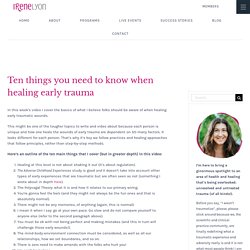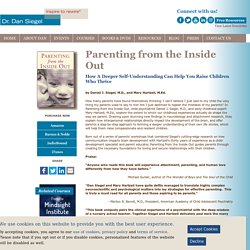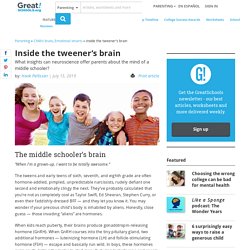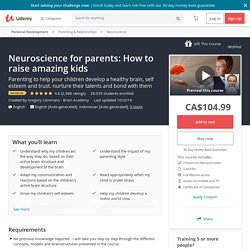

Ten things you need to know when healing early trauma - Irene Lyon. In this week’s video I cover the basics of what I believe folks should be aware of when healing early traumatic wounds.

This might be one of the tougher topics to write and video about because each person is unique and how one heals the wounds of early trauma are dependent on SO many factors. It looks different for each person. That’s why it’s key we follow practices and healing approaches that follow principles, rather than step-by-step methods. Here’s an outline of the ten main things that I cover (but in greater depth) in this video: Healing at this level is not about shaking it out (it’s about regulation). I want to open up this conversation because as a whole, the bulk of my clients and students are living with some form of untreated early trauma and it often goes undiagnosed, or is treated with methods designed for shock trauma. Early trauma usually bubbles up later in life, although sometimes it can start in childhood or adolescence. This all sounds rather depressing, doesn’t it?
Neuroception: The Missing Piece in our Children's Mental Health Crisis. Stress and Resilience: How Toxic Stress Affects Us, and What We Can Do About It. Center on the Developing Child at Harvard University. Dr. Dan Siegel - Home. Dr. Dan Siegel - Books - Parenting From The Inside Out. By Daniel J.

Siegel, M.D., and Mary Hartzell, M.Ed. How many parents have found themselves thinking: I can't believe I just said to my child the very thing my parents used to say to me! Am I just destined to repeat the mistakes of my parents? In Parenting from the Inside Out, child psychiatrist Daniel J. Siegel, M.D., and early childhood expert Mary Hartzell, M.Ed., explore the extent to which our childhood experiences actually do shape the way we parent. Born out of a series of parents' workshops that combined Siegel's cutting-edge research on how communication impacts brain development with Hartzell's thirty years of experience as a child-development specialist and parent educator, Parenting from the Inside Out guides parents through creating the necessary foundations for loving and secure relationships with their children.
Praise: "Anyone who reads this book will experience attachment, parenting, and human love differently from how they have before. " - Marilyn B. What Secure Attachment Really Is, and How to Create It (It’s Not What You Think) – Rearranged By Motherhood. Recently, a mother I know was confiding in me that through the help of professional support she was learning that her children are not securely attached.

She was shocked to learn this (though it made sense to her) as she has been a stay at home mom, exclusively breastfed, and co-slept with all of her children. She was surprised to be learning how much more there is to attachment than the things she has done so devotedly. This mother is far from alone: many mothers I’ve worked with and known feel dismayed that despite their near unflinching physical presence and availability to their child’s need to be close to them day and night, their children struggle with anxiety, tantrums, rigidity, and insecurity.
They are exhausted by the physical demands, and increasingly frustrated by the lack of ease in parenting, and wondering how much longer they can handle the exhaustion they feel. For the record, I’m a huge fan of attachment theory and the science and research behind it. Comments comments. Inside the tweener's brain. The middle schooler’s brain “When I’m a grown-up, I want to be totally awesome.”

The tweens and early teens of sixth, seventh, and eighth grade are often hormone-addled, pimpled, unpredictable narcissists, rudely defiant one second and emotionally clingy the next. They’ve probably calculated that you’re not as completely cool as Taylor Swift, Ed Sheeran, Stephen Curry, or even their faddishly-dressed BFF — and they let you know it. You may wonder if your precious child’s body is inhabited by aliens. Honestly, close guess — those invading “aliens” are hormones. When kids reach puberty, their brains produce gonadotropin-releasing hormone (GnRH). During this traumatic time, we need to provide often-unwanted (but typically much-needed) love, advice, and support — which is why it’s helpful to know what’s occurring, anatomically, in their evolving noggins. Judgment or lack thereof Pleasure seekers Weird growth Yikes! Feed the brain. Knowing neuroscience can make you a better parent. Don't you wish you could predict your child's behavior with 100 percent accuracy?

Any realistic parent knows it's an impossible daydream, but an appealing one nonetheless. Kids will always surprise you. There are so many factors that go into behavior, not to mention the fact that internal and external forces can sometimes make kids act out of character. What you can do is come to understand the stages of their neurological development and what it means for their learning and behavior. Turns out, those parents who get a good grip on how we develop neurologically, are better able to guide their children toward positive outcomes. Volume 90% Press shift question mark to access a list of keyboard shortcuts Keyboard Shortcuts Play/PauseSPACE Increase Volume↑ Decrease Volume↓ Seek Forward→ Seek Backward← Captions On/Offc Fullscreen/Exit Fullscreenf.
Neuroscience for parents: How to raise amazing kids. Congratulations!

You just found the N°1 course on parenting on Udemy. With over 27.000 students and raving reviews, you can't go wrong with this one... Thanks to this course I've been asked for countless interviews, podcasts and conferences. I've even been asked to collaborate on a UNICEF backed project to help parents in the education of their kids. This is the real deal. Brain-based Parenting.